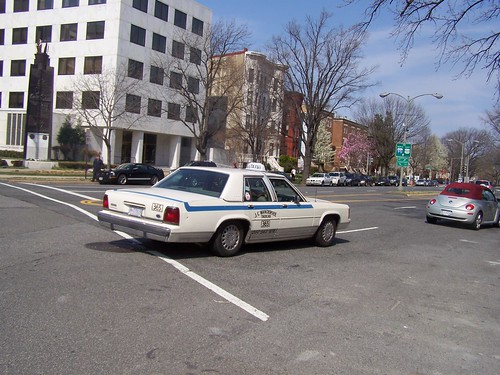Told you so: taxi edition
 Actually, I am past the "told you so" stage. The way I say it now is that there should be studies and plans. So today's Post has a big story, "D.C.'s cabbies fear being pushed out of taxi business," on the taxi industry in DC, and how many cabbies believe that changes promulgated in new legislation (done without the benefit of significant planning or studies) in how the industry is organized will force more cabbies out of business.
Actually, I am past the "told you so" stage. The way I say it now is that there should be studies and plans. So today's Post has a big story, "D.C.'s cabbies fear being pushed out of taxi business," on the taxi industry in DC, and how many cabbies believe that changes promulgated in new legislation (done without the benefit of significant planning or studies) in how the industry is organized will force more cabbies out of business.The article states:
Taxi drivers’ activism and dollars helped oust Adrian M. Fenty as mayor and get Vincent C. Gray elected in 2010. But many drivers now say Gray is much worse than Fenty. Not only did many fares decrease when meters were installed, but the city scrapped shared rides and eliminated night and fuel surcharges — blows to drivers’ income.
Note that the editing for this paragraph is bad. Whether or not "Gray is worse than Fenty," the changes that are described happened under Mayor Fenty, not Mayor Gray.
I averred that income would drop when changes in taxi industry regulation were considered under the Fenty Administration. I said a few things:
1. The biggest concern that people had--other than bad service--was a level of uncertainty about fares, because the zone maps were unclear, etc.
2. But you could do meters for zones too, not just by the minute.
3. And that by switching to traditional meters AND giving up the ability for a run to include multiple passengers going to multiple destinations, revenues would go down as would the "efficiency" of the industry and its relative sustainability.
It's come to pass. (post in DC Watch)
Too bad legislators and the executive branch don't have much belief that planning is a good thing, and that drastic changes in regulated industries ought to be considered through planning studies first.
The Transportation Element in the Comprehensive Plan doesn't even mention taxis. Taxis should be addressed in the forthcoming Transportation Master Planning Process that the DC Department of Transportation is about to embark upon.
Labels: taxi and jitney services, taxis, transportation planning



0 Comments:
Post a Comment
<< Home